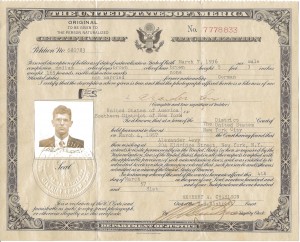When I volunteered for the draft in the United States, in April 1954, I was still a “stateless person”, a non-citizen of the world, made so by the laws of the Third Reich. I was not yet a citizen of the United States because I had been in the country somewhat less than five years, and five years in the United States was the absolute minimum required for citizenship. I went into the Army as a stateless person, a situation I intended to correct while in the Service. I had passed the OCS (Officer Candidate School) test, but I was too young to be an officer, being only eighteen at the time, and I was not a citizen, something no one had mentioned as a requirement for OCS. So, I decided to become a US citizen as soon as possible, as the age problem would resolve itself. However, “’tween the cup and the lip, there’s often a slip,” and I forgot about citizenship in the excitement of my new infantry training environment in Fort Dix and later, in Fort Davis, Canal Zone, where slipping around in the mud of the Panamanian jungle gave me enough to think about. And then came the Fort Clayton Stockade, and that was where the thought of citizenship hit me again.
I won’t go into all the details of life in the stockade or how I came to be there, having posted that earlier (you can read the entry on the Fort Clayton Stockade and the ones which follow it), but one of the things I may not have mentioned was that whenever prisoners went on a work detail outside the stockade, they were accompanied by one or two guards with shotguns. However, while in the stockade, I decided to become an American citizen, and notified the commanding officer of my wish. He, in turn, informed me that he did not think it such a good idea, as I would have to pledge allegiance to the United States for the first time between two guards with shotguns, and that would probably not look too good. He suggested that I wait until I got out of the stockade and try again after that. I saw his point and desisted.
So I waited until I was out of the Army and tried again. I was mildly worried about having to take a test about American history, but the test I took was not what I expected. It consisted of one sentence. I was asked to write, “I want to become an American citizen”; I did so, and that was it. I was given a time and place for the oath taking ceremony which was to take place later.
When I reported to the court house to be made an American citizen, I joined a group of about 35 others there for the same purpose. As we stood in front of him, the judge made a little speech about the responsibilities of being an American citizen, and then asked us to raise our right hands. He led us in the Pledge of Allegiance, after which he congratulated us, and asked us if any of us would like to change our names, as this was a good time to do it. Only one small man raised his hand, and the judge asked him what he wanted his name changed to. The man answered that he wanted to change his given name to “Izzy.” The judge then asked him what his name was now, and he answered, “Israel.” “Motion denied,” said the judge firmly, and I walked out of the building an American citizen.


I guess the judge didn’t like the name Izzy? You’re so lucky becoming a citizen was so easy! I wish my test had consisted of writing down one sentence. 🙂 Oh, how the times have changed.
I went to Foley Square to apply and whilst wearing an Adlai Stevenson button was asked by a burly irish clerk whether I planned to be a Democrat once I was a citizen and then he handed me the application. “Of course” I responded and later after completing the form ,I returned to his window , handed him the form which he reviewed and then directing me to raise my right hand, he asked me to recite the Pledge of Allegiance which he followed with an oath of citizenship.
No test, times did seem simpler then.